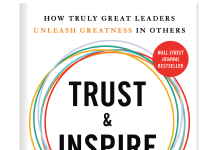If the future sees artificial intelligence (AI) reach the level of integration in today’s workplaces that it is expected to, I believe the business world will be left with a wonderful opportunity to reinvest its focus on the competitive advantage that has the power to underpin organizational success—people and awareness.
In many ways, AI and other technological advancements afford organizations the time and scope to reinvest in the way we recruit, train, and develop people so that those supremely, exclusively human traits can guide the way we work and achieve professional success.
In this fast-paced, technological, global workplace, rediscovering our humanity and developing self-awareness is the key to several things, including:
- Successful leadership. 21st century leaders face a plethora of challenges. They need to motivate diverse groups of people, work across organizational boundaries, improve efficiency, and achieve growth. Externally, they face a complex and globalized environment. Sounds easy enough, right?
Poet Maya Angelou said, “People will forget what you said, people will forget what you did, but people will never forget how you made them feel.” This holds up in numerous academic studies that demonstrate employees have far greater trust in highly self-aware leaders.
In reality, leaders, like all human beings, don’t have all the answers, and are, in fact, often wrong. The difference is that the most successful ones are aware of this. That is why they succeed.
- Getting the best from different types of people. One of the most common differences encountered in the business world is between introverted and extroverted colleagues. In the future, as organizations are forced to think more broadly about diversity, they will need to get the best out of these working styles to increase their competitive advantage. The working world no longer operates within the dynamic of “whoever shouts the loudest” wins.
The labels of “extrovert” and “introvert” are not an indication of how socially adept a person may be, rather a preference in how he or she works. On a bad day, two people with different preferences could be in the same meeting and come away with an entirely different impression of what took place. Often, this is a result of each person’s personality preference manifesting in his or her preferred communication style, rather than taking the time to understand the preferences of a teammate and adapting his or her approach accordingly.
By learning to view the world through different perspectives and being open to adjusting our own behavior in the interest of connecting, each of us can help build a team that’s composed of complementary strengths and weaknesses.
- Global teaming. American psychologist Rollo May said, “Communication leads to community, that is, to understanding, intimacy, and mutual valuing.
Never has a word been more truly spoken, particularly at a time that an increasingly dynamic business environment has made it more common for managers to lead remote teams spread across different buildings, cities, countries, and even continents.
Helping staff working in remote or transient teams to become more self-aware, so they can communicate effectively with their colleagues (who may well come from very different cultures), can have a significant impact on the bottom line of a business, as well as lead to a happier workforce.
- Tackling unhealthy conflict. The old saying goes: “There’s nowt so queer as folk.” While we may like our colleagues greatly, we often can be shocked or disappointed by their actions. So how do we work together to ensure these differences do not develop into barriers and rifts?
The answer is that we have to gain a deeper understanding—first of ourselves, then of our colleagues. Practicing self-awareness can help you acknowledge your reality is not everyone else’s and that everyone sees the world through his or her own personal filter.
When we increase our understanding of how differing perceptions impact conflict, we often remove the confusion of the conflict. This can allow for underlying causes to become clear. When we can remove perception-based interference, understanding between people can grow and become a bridge toward resolution.
We don’t have the benefit of a crystal ball to show us what the future of the working world will bring, but we will be better equipped for whatever comes by reinvesting in our people and equipping them to understand themselves, and others, and to make a positive difference in everything they do. When technology takes care of everything that isn’t human, businesses have the opportunity to allow their people to be gloriously free and empowered to bring their whole selves to their roles and to their organizations.
Andy Lothian is the co-founder of Insights Learning and Development and is the Group CEO of Insights Group, encompassing Insights Learning and Development and Dogfish mobile. He was EY’s 2016 Scottish Entrepreneur of the Year and the winner of Hr Network Scotland’s 2018 Outstanding Contribution to Scottish HR Award.




